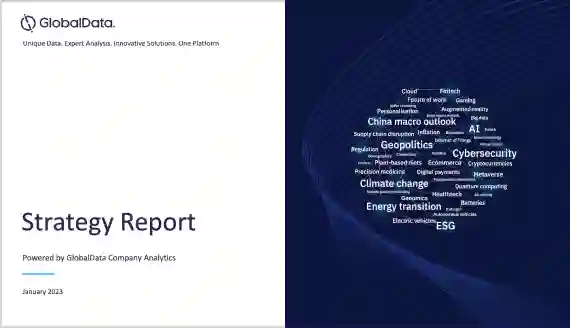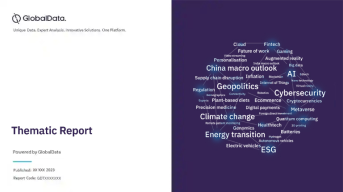Sharing Economy – Thematic Research
Powered by ![]()
All the vital news, analysis, and commentary curated by our industry experts.
Sharing economy is an economic system in which private individuals share assets and services, either free or for a charge, often using a community-based online platform. The primary concept behind any sharing economy business model is that of access versus ownership: rather than buying an asset, the consumer rents it from someone else. Sharing economy platforms bring together owners and consumers of assets and services and facilitate a marketplace in them. The sharing economy platform itself rarely owns any of the assets it offers. For example, Airbnb does not own any hotels, and Uber does not own any taxis.
What are the key technology trends impacting sharing economy?
The key technology trends of sharing economy are social media, artificial intelligence (AI), cybersecurity, and blockchain.
Social media
Social media has significantly influenced the way people travel, dine, and shop. For example, travelers visit websites like TripAdvisor and Airbnb to plan their itineraries and look at ratings on Zomato before choosing a restaurant. Individuals active on social media are happy to trust others’ opinions online, which has been the backbone of the sharing economy.
AI
Sharing economy platform providers use AI to improve customer experience. According to GlobalData’s Emerging Technology Trends Survey 2020, 45% of executives believe that AI will play a vital role in improving efficiency in their existing business operations over the next three years. Analyzing user data such as age, location, previous searches, and browsing history allows them to offer a more personalized service.
Cybersecurity
A sharing economy company’s success rests on using data to offer better services and a more personalized experience. This requires collecting and storing vast amounts of user information, including (but not limited to) personal, medical, and financial information. In most cases, individuals access sharing economy platforms from personal devices that lack standard enterprise-level security.
Blockchain
According to the Blockchain Council, the major challenge with the sharing economy’s current business model is that its profits are not shared fairly among all involved. Instead, most of the profit generated is captured by the large intermediaries that operate the leading sharing economy platforms. Blockchain technology can potentially introduce a new, decentralized sharing economy business model.
For more insights on sharing economy theme, download a free report sample
What are the key macroeconomic trends impacting sharing economy?
The macroeconomic trends impacting sharing economy are COVID-19, China, urbanization, strategic partnerships, ESG.
COVID-19
The COVID-19 pandemic has caused significant problems for sharing economy companies worldwide. With extended lockdowns in many countries and the global economy entering a deep recession in 2020, companies like Uber, Lyft, Grab, and Airbnb saw bookings drop sharply.
China
China has adopted a general regulatory framework for all sharing economy activities, and the government has created policies to encourage growth. Currently, the regulatory environment of China’s sharing economy is fragmented. The regulations around the sharing economy are largely industry-specific (i.e., there are separate regulations for online taxi service management and shared accommodation) and are implemented by local governments and departments.
Urbanization
Similarly, rapid urbanization coupled with limited housing options has driven the need for shared accommodation in urban areas. In cities with large numbers of young people, there has been a surge in demand for professionally managed co-living or student accommodation.
Strategic partnerships
Old economy companies across a range of sectors have forged strategic partnerships with sharing economy companies to sell sharing economy services. For example, in June 2020, Volvo partnered with Waymo to develop an autonomous electric vehicle for ride-hailing services.
ESG
The sharing economy is based on the principle of sharing or renting assets. This leads to a reduced need for goods, which results in reduced production. A decrease in production should mean less pollution, supporting environmental sustainability.
For more insights on sharing economy theme, download a free report sample
What are the key regulatory trends impacting sharing economy?
The key regulatory trends impacting sharing economy are carbon emissions, data privacy, labor rights.
Carbon emissions
The auto industry is led by regulation as much as it responds to consumer demand. From Corporate Average Fuel Economy (CAFE) regulations in the US to Regulation (EU) 2019/631 setting CO2 emission performance standards in the EU and the Bharat regulations in India, all have shaped the average CO2 emission performance standards for the sale of new passenger cars and light trucks.
Data privacy
Participation in the sharing economy typically requires users to provide personal information, including their location, consumption habits, photos of personal items, credit card information, and travel habits. Consumer and data protection laws mostly cover the deceptive use of personal information. However, the speed at which the sharing economy is evolving will require agile responses from a data privacy perspective.
Labor rights
A persistent criticism of the sharing economy relates to its classification of workers (commonly referred to as gig workers) as independent contractors. This disqualifies them from receiving the basic protections and benefits of full employment, such as maximum working hours and paid time off. In most countries, including the US and the UK, labor laws continue to depend on distinctions between employees and independent contractors.
For more insights on sharing economy theme, download a free report sample
What was the impact of COVID-19 on sharing economy?
COVID-19 had a significant impact on sharing economy. Worldwide travel restrictions badly hit the accommodation and transport sectors. At the time of writing, travel restrictions are easing in many countries, and people have started traveling more widely again. Consequently, demand for shared accommodation and ride-hailing services has begun to improve.
The sharing economy business model is adjusting to the changing market landscape. Alongside its negative effects, the pandemic also generated new opportunities for P2P knowledge and skill-sharing services. In addition, office closures increased the demand for freelance work. Below are some examples of sharing economy companies that benefitted from the pandemic.
For more insights on sharing economy theme, download a free report sample
What are the different categories of assets and services involved in sharing economy?
The different categories of assets involved in the sharing economy are vehicles, property, consumer goods, and equipment. The different services involved in the sharing economy are financial services, educational services, and personal and professional services.
Which are the key companies associated with the sharing economy theme?
Some of the key companies associated with the sharing economy theme are Airbnb, Comuto (parent company of BlaBlaCar), Didi Chuxing, eBay, Expedia Group, IWG, Kickstarter, Lyft, ShareNow, Uber, and WeWork.
Market report scope
| Key technology trends | Social Media, Artificial Intelligence (AI), Cybersecurity, and Blockchain |
| Key macroeconomic trends | COVID-19, China, Urbanization, Strategic Partnerships, and ESG |
| Key regulatory trends | Carbon Emissions, Data Privacy, and Labor Rights |
| Key companies | Airbnb, Comuto (parent company of BlaBlaCar), Didi Chuxing, eBay, Expedia Group, IWG, Kickstarter, Lyft, ShareNow, Uber, and WeWork |
Scope
- This report provides an overview of the sharing economy theme.
- It identifies the key trends impacting growth of the theme over the next 12 to 24 months, split into three categories: technology trends, macroeconomic trends, and regulatory trends.
- It includes comprehensive industry analysis, including analysis of company filings, hiring, and social media trends.
- It contains details of M&A deals driven by the sharing economy theme, and a timeline highlighting milestones in the development of the sharing economy.
- The detailed value chain is split into four segments: shared assets and services, infrastructure, sharing economy platforms, and use cases.
Key Highlights
Technology has emerged as the key enabler for the adoption of the sharing economy. Companies are now using GPS, data analytics, and artificial intelligence (AI) to connect consumers with owners in real-time.
Today’s sharing services are supported by technologies that store and process vast amounts of data about people and assets. Data analytics plays a crucial role by deploying models that collect and analyze extensive data sets and provide users with actionable insights. The technology will continue developing and evolving, becoming more suited to facilitating the sharing economy.
Reasons to Buy
- Over the past few years, the sharing economy has grown rapidly, driven by increased urbanization, technological advancements, greater familiarity with peer-to-peer sharing, fewer entry barriers, and the financial gains it offers to consumers. Moreover, high mobile penetration and the increasingly important position of millennials in the global economy—alongside increased demand for shared assets—have paved the way for new business opportunities and additional revenue streams for both individuals and businesses.
- This report provides a detailed overview of this increasingly important theme, including identifying leading companies across all aspects of the sharing economy.
Zipcar
Flinkster
Getaround
EvCard
Delimobil
BelkaCar
GoGet
BlaBlaCar
Heetch
Liftshare
Wunder Mobility
Waze
Via Transportation
easyCar Pool
Carma Technology
Uber
Didi Chuxing
Waymo
Kapten
Lyft
Grab
Gett
Bolt
VistaJet
Flexjet
NetJets
SurfAir
GetMyBoat
Wheels Up
Click & Boat
Boatsetter
Airbnb
TripAdvisor
HomeExchange
SimplyGuest
Booking.com
Expedia
NestAway
9flats
WeWork
IWG
Talent Garden
Ucommune
Impact Hub
Newmark Group
Venture X
Alley
Walmart
Target
StoreMore
BoxMySpace
Storefront
SharedRetail
Pop Up Shops
Brixmor
DHL
FedEx
Ceva Logistics
Nippon Express
Stashbee
WareSpace
ReadySpaces
Spartan Logistics
Rent the Runway
GlamCorner
Gwynnie Bee
DesignerShare
The Volte
Wardrobe
ShareWear
The Clothes Library
Abcomrents
Flex IT Rent
Mr Rental
Radio Rentals
GSE AudioVisual
Hamilton Rentals
Rentacomputer
Rush Computer Rentals
ToyLibrary
Pley
KiwiCo
Toy Box Monthly
Whirli
Green Pinata Toys
Toy Box Tots
Dozr
EquipmentShare
Getable
Caterpillar
Sunbelt Rentals
BigRentz
United Rentals Home Depot
Cohealo
MedShare
Collateral Medical
Stanley Healthcare
US Med-Equip
Agilit
3M
Shared Medical Services
Funding Circle
China Rapid Finance
Lending Works
Lufax
Landbay
Prosper
Upstart
SoFi
Kickstarter
Indiegogo
GoFundMe
Wefunder
Classy
Patreon
CircleUp
IgnitionDeck
Shuidihuzhu
Friendsurance
Teambrella
Nexus Mutual
Ledger Investing
Lemonade
Otherwise
WeGroup
Blackboard
Coursera
Degreed
Udacity
Udemy
Byju’s
Board Infinity
ExecOnline
Teachers Pay Teachers
Brainly
Coursmos
Lark Technologies
DreamBox Learning
EdisonLearning
Learning Pool
LinkedIn Learning
Upwork
PeoplePerHour
Hubstaff
Outsourcely
Freelancer
Fiverr
ServiceScape
Guru
TaskRabbit
Thumbtack
99designs
Shiftgig
Care.com
Wonolo
Nextdoor
Porch Group
Table of Contents
Frequently asked questions
-
What are the key technology trends impacting sharing economy?
Social media, artificial intelligence (AI), cybersecurity, and blockchain are the key technology trends in sharing economy.
-
What are the macroeconomic trends impacting sharing economy?
COVID-19, China, urbanization, strategic partnerships, ESG are the macroeconomic trends impacting sharing economy.
-
What are the key regulatory trends impacting sharing economy?
Carbon emissions, data privacy, labor rights are the key regulatory trends impacting sharing economy theme.
-
Which are the key companies associated with the sharing economy theme?
Airbnb, Comuto (parent company of BlaBlaCar), Didi Chuxing, eBay, Expedia Group, IWG, Kickstarter, Lyft, ShareNow, Uber, and WeWork are the key companies associated with the sharing economy theme.
Get in touch to find out about multi-purchase discounts
reportstore@globaldata.com
Tel +44 20 7947 2745
Every customer’s requirement is unique. With over 220,000 construction projects tracked, we can create a tailored dataset for you based on the types of projects you are looking for. Please get in touch with your specific requirements and we can send you a quote.
Related reports
View more Technology reports










